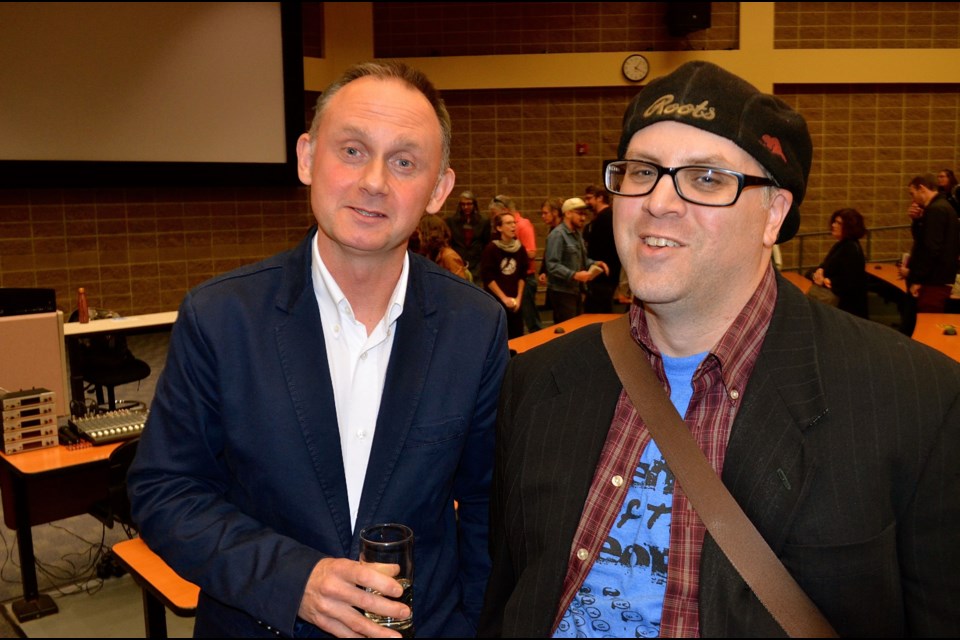College radio is well known for providing alternative programming but it has also helped to launch the careers of a number of successful media personalities such as Dick Clarke and Howard Stern.
It gives student journalists and broadcasters an opportunity to cut their teeth before entering the job market but that may change with the announcement of provincial budget cuts and the introduction of the Student Choice Initiative, which allows students to opt out of supporting college radio through their tuition fees.
“We can’t really talk much about the cuts,” said radio host Scottie Hertz. “It is certainly having its effects but the long game is, they thought TV was going to kill radio and we are still here a hundred years later.”
Hertz and co-host Adam Donaldson produce Open Sources Guelph, a weekly, political and current events discussion show on CFRU 93.3 FM at the University of Guelph where they welcome guests from all levels of government and newsmakers of all kinds to discuss the issues of the day.
The show is a passion project of sorts for Hertz and Donaldson who are volunteers at CFRU.
“I don’t, totally, like the term community journalism but it is that in a sense,” said Hertz. “I consider myself a community journalist.”
Hertz was born in Mississauga but holds a dual Canadian-UK citizenship. He discovered his passion for community radio after he came to the U of G to study agriculture.
“I came to Guelph 30 years ago for school and ended up staying,” said Hertz. “I was an ag student and planned on getting into farming big time but I didn’t. I ended up working in IT for most of the 90s then came back here and worked in Crop Science for a few years and now I work in the electrical shop.”
Donaldson was born in Georgetown but has a similar story.
“I came here for school and hung around,” he said. “I took history and a bunch of English, politics and other bachelor of arts courses. I kind of had no idea what I wanted to do with my life and sometimes I still don’t.”
Shortly after starting at U of G he volunteered with the student newspaper, the Ontarion.
“That was my gateway drug into journalism stuff,” said Donaldson. “I was the editor for the Ontarion for a year. I was arts and culture editor and then I was editor for the Cannon for a year and then I went back the Ontarion and was editor and chief.”
He has continued his work as a freelance reporter, columnist and videographer in the community and provides up to the minute Twitter reports from @adamdonaldson during Guelph City Council meetings.
“Right now I do Politico and I am a GuelphToday contributor,” said Donaldson. “I do another show on CFRU called End Credits where we review movies and talk about movies and stuff.
Hertz and Donaldson met as volunteers at CFRU. Donaldson was providing content for Politico and Hertz was doing a show called Working Week that focused on labour and working in the community.
“We worked on a show together called Beyond the Ballot Box,” said Hertz. “It was a weekly panel show. Phil Alt was on it and there was a rotating cast of characters. Jan Hall was the brains behind it but when her show Folk Roots took off that became her focus.”
Hertz and Donaldson decided to take over the slot and rebranded the show as Open Sources
“Our first show was after the New Year of 2015,” said Donaldson. “I remember it was right after the Charlie Hebdo attack. That was our top story for our first show.”
Open Sources airs live every Thursday at 5 p.m. and is cycled throughout the week in other time slots. Episodes are also available on the CFRU website archives. The show covers a broad range of topics and welcomes newsmakers, especially politicians to talk about their pet projects and platforms. They invite candidates from every party during every election as well as MPs, MPPs, mayors and councilors to come on the show at least once a year or more if they are willing.
“We feel like we serve something that isn’t really covered,” said Hertz. “We try to sit down for half an hour with all the candidates so everyone can hear what they sound like and get an idea of the person. It starts with Guelph and expands from there.”
It is the mandate of CFRU to provide alternative views and perspectives whenever possible and that is their objective as well.
“We have a mutual interest in news, politics and current events and a desire to present points of view about stories that you don’t get on CBC radio or on the TV news or the major newspapers,” said Donaldson.
They also help to train U of G students and people in the community who have a show idea they want to air or simply need training and experience working in radio.
“There are tons of volunteers who want to get involved,” said Hertz. “We had training on Tuesday night and there was a dozen people. I could say something sentimental like I do it for the love of it but it is true. It’s not just about the show because it goes beyond that.”
His co-host feels the same.
“I think we can talk generally and say the reasons CFRU was here in 1980 are the same reasons it is here in 2020,” said Donaldson. “It’s because you can’t really walk into Magic FM and say can I host a show? You can walk into CFRU and ask 'can I host a show'? We will even train you to do it.”

.png;w=120;h=80;mode=crop)

